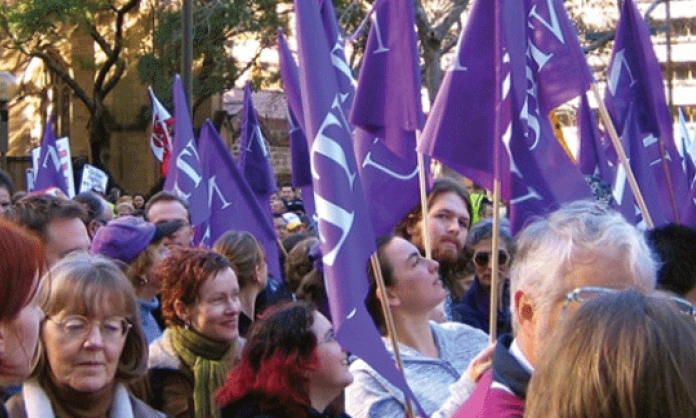Earlier this year, I was in the Fair Work Commission as part of a union case. The vice-president of the commission described Sydney University as a “workers’ paradise”.
Today, we’re in a fight for our jobs. The administration has announced a series of dubious redundancies across the university. Managers have been brought in with one mission – corporatisation.
When cuts are afoot, the process starts via the release a “draft change proposal”. Staff are led to believe that genuine consultation will follow. It’s just a “draft” after all. Then a new organisational structure is distributed. Your position either doesn’t exist any more or is reclassified under lower pay, with a higher workload. It’s a “spill and fill”.
The process makes a mockery of the idea of job security. It destroys creativity and initiative. For years, during performance reviews, we are told to reinvent ourselves. Many oblige, and most put in hours of overtime to make up for the staffing shortfalls endemic in university departments.
An NTEU survey released in July found that staff donate $1.7 billion worth of unpaid overtime to universities each year.
In my faculty, staff will be issued redundancy notices in the middle of semester. Already, the “consultation process”– an exercise in box-ticking – has exhausted and demoralised many. This is exactly what it’s designed to do.
No amount of reasoning or argument will stop a restructure because a restructure isn’t really about efficiency or improving service. A restructure is designed to cut costs, assert managerial power and provide an excuse to get rid of staff who are seen as troublemakers.
But even those who are compliant and remain silent are not spared. Expert in your field? Who cares? You’re gone. Put in years of overtime? Thanks. You’re gone. Built complex systems to improve education delivery? Interesting. You’re gone too. Workers who expected that their loyalty would be rewarded are learning that “managerial prerogative” knows no such concept.
Why fight?
To challenge their prerogative, accepted as inviolable by the commission and the courts, workers need to organise collectively and reject their logic. This is no easy thing given the current political situation. Australia’s anti-union laws mean that we can’t lawfully strike outside of bargaining for an enterprise agreement.
But there’s always something that can be done. The union has called a demonstration for 5 August. It’s important. Not because one demonstration will reverse the cuts, and not because two or three necessarily will. But because each action builds solidarity and gives us a sense of our collective power. It cuts against the feeling of isolation we all feel at work.
It matters that the union has reacted publicly. Polite negotiations get us nowhere. In the process of organising and building these actions, new activists can be born. This can be decisive in future disputes. Already, new people have stepped forward in this campaign. This is because the union has given a lead and openly called management’s plans an attack on us.
And by organising in our union, we can have small victories. In the current restructure of postgraduate services, 20 jobs have already been saved.
Every flicker of resistance from workers is precious. Whether it’s attending a demonstration, putting up a poster at work or just saying “I’m calling the union”, any action is a public rejection of management’s attempt to make us feel small, unproductive and worthless.










